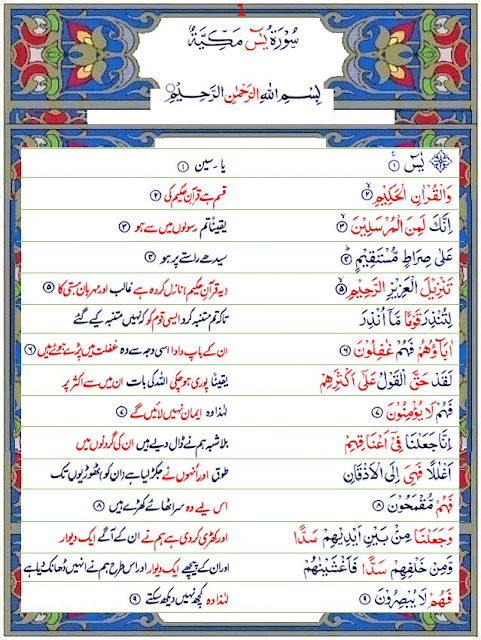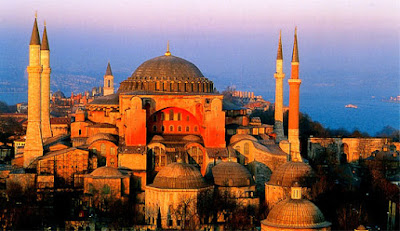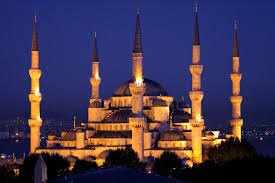It is true that Hazrat Bibi Ayesha Announced the Fatwa Against Hazrat Usman. Please read the below reference for details.
Wednesday 15 June 2016
Tuesday 7 June 2016
Hazrat Ali A.S Quotes
Posted By:
Admin
on 02:14:00
Hazrat Ali A.S is first cousin and Son in Law of Hazrat Muhammad SAWW. He is son of Hazrat Abu Talib (uncle of Hazrat Muhammad). In this post we are going to publish some of important and famous quotes by Hazrat Ali A.S
- Dolat miti ki tarhan hai or miti ko paon k neechay rakhna chahieay. Agr sir char jaey to Qabar bun jati hai. Or Qabar zinda logon k liay nai hoti.
Friday 3 June 2016
The Misunderstanding Of Islam: Why Anti-Muslim Sentiment Threatens America
Posted By:
Admin
on 06:10:00
Over recent months, the Islamic State of Iraq and Syria (ISIS) has gained significant ground in the Middle East. This group, which the United States and other nations have labeled as a terrorist organization, has led to a widespread anti-Muslim sentiment that poses a major risk to Americans.
The Basic History and Core Beliefs Of Islam
Islam is a 7 th -century-based, monotheistic faith that states that Muhammad was the last prophet of God (Allah), and that Muhammad received revelations that were recorded in what's now known as the Qur'an. People who practice Islam (Muslims) believe in angels, as well as divine preordainment, an afterlife and resurrection. They are supposed to live by the five pillars of testimony (declaring faith in God alone), prayer, the giving of alms, fasting and a pilgrimage to the holy city of Mecca. In this way, Islam and Christianity have many similarities. In fact, Muslims acknowledge that the fundamentals of their faith have been echoed many times, including by individuals such as Abraham, Noah, Moses and Jesus, whom they consider to have been prophets. They do not dismiss the teachings of these people, but rather follow the Qur'an given to Muhammad because they believe it is the only unaltered or "true" interpretation of God's word.
Islam and Jihad
Islam contains a concept called jihad, which scholars and Muslim leaders often distinguish into two types. The so-called "greater" jihad refers to the continual striving of a Muslim toward spiritual betterment and oneness with God--that is, the basic fight against sin, evil or the Devil. The second or "lesser" jihad refers to warfare against non-Muslims or those who threaten Islam--it is the only type of warfare Islam permits. Only a fraction of Muslims are active fighters or lesser jihadists.
When Fear Spawns Hate and a Negative Stereotype
Worldwide, Islam is the second largest religion, with the Muslim population estimated to be in the neighborhood of 1.5 billion. Within the Muslim group, only about 150,000 are members of ISIS. Of those ISIS members, only about a third are active soldiers as of 2014. Even though ISIS represents only a tiny fraction of Muslims, the heinousness of ISIS' jihadist activities has garnered them an almost continual media spotlight, which has shaped the way people think of Islam followers on a larger scale. Not understanding that the majority of Muslims are deeply critical of ISIS and denounce their behavior as contrary to Islam, many Americans have adopted an anti-Muslim ideology. As an example, in September 2014, the far-right group American Freedom Defense Initiative sponsored a series of anti-Muslim ads posted on New York city buses, as reported by Marisa Taylor of Aljazeera America.
An anti-Muslim stance is detrimental to America on several fronts. First, it creates unnecessary fear that disrupts and divides hundreds and even thousands of communities across the country. Muslims are facing intense discrimination in the workplace, for example, as found by a 2013 Carnegie Mellon study. They are turned away for services, as well--Arkansas gun range owner Jan Morgan made headlines in early October 2014 for declaring her facility a "Muslim-free zone". Although some individuals say Morgan's actions are justifiable given that her trade is associated with weaponry (hogwash given that Muslim citizens have the right to bear arms like anyone else), the refusal of services to Muslims has extended into other areas many people depend on in daily life. A Muslim woman from Boca Raton, Florida, for example, reportedly was refused the $20 in gas she needed for her car. This makes it very difficult for Muslims to develop skills, earn income and support the general economy. It also can strain the law enforcement and legal systems, whose members have to respond to conflict calls and spend time litigating cases.
Secondly, anti-Muslim concepts are being tied to politics. For instance, in October 2014, a photo was snapped of a truck reportedly from Oklahoma that combined anti-Muslim ideology with an attack on President Barack Obama, showing a decal that read, "Muslims Go Home And Take Obama With You!!". These kinds of messages foster mistrust of the entire administration, making it extremely difficult for Democrats and Republicans to find common ground, even on issues totally unrelated to the Middle East. As both sides struggle to reach agreement, ISIS has time to recruit, grow and plot attacks, putting the country in crisis.
Conclusion
Although Americans should not ignore the real threat that ISIS poses to the United States and larger world population, the members of this organization represent only a tiny percentage of Muslims, most of whom denounce the group's activity. Failure to recognize how Muslims view ISIS and the general core principles of Islam contributes to economic, social and political instability that the United States cannot afford.
Note: This article has been written by Wanda Marie Thibodeaux.
The Most Beautiful Mosques In Istanbul
Posted By:
Admin
on 05:54:00
The exotic and exciting city of Istanbul is one of the most-visited tourist destinations in the world; the appeal of the Bosphorus Strait, spice markets, and the harem of the sultans is intoxicating. Its history as a former Christian imperial capital (Constantinople) and an important city in the modern Islamic world gives Istanbul a unique cosmopolitan flavor, welcoming to all. Visitors of any background can step inside the city's beautiful mosques to experience the customs and traditions of Turkish Muslims--and learn that they aren't so foreign as outsiders might expect.
Hagia Sophia
For Christians discovering the Muslim world for the first time, there is no better place to start than a building that has been both a Christian church and a mosque. In the heart of the historic Sultanahmet district, this sixth-century domed wonder was the center of Istanbul's religious influence for nearly a thousand years--first as an Eastern Orthodox cathedral, then as a mosque after the Ottomans moved in.
Today, it's a tasteful museum, honoring both traditions and both histories. Note the alterations made during the church's Christian-Muslim transformation: the central apse, originally built to face Jerusalem, has been modified to face a few degrees to the south, to Mecca. The faces of angels and important characters in Christian circles were covered by Islamic calligraphy--depiction of human images is forbidden in mosques. Thankfully, some of the original Christian mosaics and frescoes were only covered with plaster, and have been restored to create the well-balanced presentation seen in Hagia Sophia today.
Blue Mosque
Just across Sultanahmet Square from Hagia Sophia is the much newer--but still pretty venerable, built in 1616--Sultan Ahmet Mosque, commonly called the "Blue Mosque" in English thanks to its highly decorative blue interior. Unlike Hagia Sophia, this is a working, breathing place of worship; neighborhood residents use the mosque for daily prayers, washing themselves in the ritual pre-prayer cleansing with the taps in the courtyard and spending a few minutes in silent meditation inside.
Visitors enter through a separate entrance--no shoes, please--and are requested not to disturb those praying in rows on the floor. No pews in the mosque, just a grand space, decorated with almost impossibly intricate tile mosaics and gold-leaf calligraphy. Rather than sit in rows of hard wooden benches, the faithful kneel in lines marked on the carpet.
Looking around, Christians--practicing and "cultural Christians" alike--will notice echoes of their own traditions: a ritual with water, candles, decorated walls and windows, a central pulpit (called a mihrab) from which a cleric leads a weekly service, an audible signal from a tall tower that services are about to begin (bells for Christian churches, a vocal chant for the mosque). Even modesty rules (no bare shoulders or legs for men or women; women must also wear a head covering) shouldn't seem too unfamiliar--many western religious denominations require strict dress codes.
Mosque of Suleyman the Magnificent
Larger than the Blue Mosque, and high up on a hill overlooking Istanbul's Golden Horn, the Mosque of Suleyman the Magnificent gets significantly less tourist foot traffic than its more famous friends down in Sultanahmet, but it's no less worthy of a visit, and just as welcoming to non-Muslims.
The interior follows many of the same conventions of the Blue Mosque--intensely decorated, high-domed, hauntingly beautiful, and still in use by local worshippers. Before stepping inside, however, visitors are encouraged to explore the cemetery in the courtyard. Just like the traditions of other Abrahamic faiths, Muslims are buried in consecrated ground in view of their places of worship. Walk through the headstones and admire the detailed carvings and finish with a visit to the opulent mausoleums of Suleyman--the Ottoman sultan who funded the construction of this mosque--and his family.
Istanbul has more than its share of touristy excitement and exotic appeal, but Western visitors should consider taking some time to visit these mosques to experience the local traditions firsthand. After visiting these three beautiful, sacred places, you'll have a better understanding of the mainstream Islamic world and its practices, which you might be surprised to see aren't so different after all.
Surah Yasin, Read, Listen Or Download Surah Yaseen
Posted By:
Admin
on 04:26:00
Surah Yasin is well known as heart of Quran Majeed. Hazrat Muhammad (SAWW) received this Surah Yaseen in the cave of Hira. Hira is well known as “Gaar E Hira” in Arabic language. If you feel that you are in trouble, do read this Surah everyday, i assure you that you will found your self easy infact very easy.

Surah Al-Baqarah - Listen Or Read With Urdu/English Translation
Posted By:
Admin
on 03:57:00
Surah Baqarah is longest chapter of Quran Pak. In english, Baqarah mean Cow. It reached to Hazrat Muhammad (SAWW) in Madina. It is the first chapter reached to Prophet Muhammad (SAWW) when he did hijra from Mecca to Madina.
Subscribe to:
Posts (Atom)
















